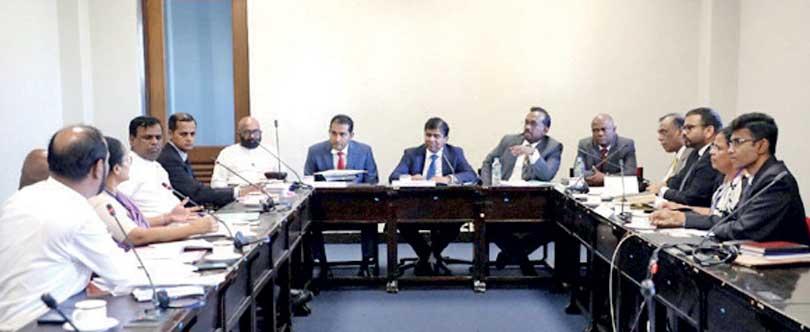05 Jan 2024 - {{hitsCtrl.values.hits}}

Committee meeting in progress in parliament
Underscoring the need to amend the current Inland Revenue Act, the Sectoral Oversight Committee on National Economic and Physical Plans Chairman Mahindananda Aluthgamage highlighted that current legislation allows taxpayers to evade paying their income taxes for up to 15 years. This is primarily due to extensive appeal and court procedures.
“The Inland Revenue Department has 30 months under the existing Act to assess a tax file and another 24 months to consider appeals. Accordingly, if a tax file remains in the Inland Revenue Department for more than 54 months, and after appealing to the Tax Appeals Commission, they receive 2 years according to the Act.
“Thereafter, appeals can be made to the Court of Appeal and the Supreme Court and it will consume approximately 15 years,” Aluthgamage said during a committee meeting in parliament recently.
According to IRD officials addressing the meeting, the arrears tax revenue due as of 30 June 2023 is Rs. 943 billion, of which the amount that cannot be recovered due to various reasons is Rs.767 billion and the recoverable amount is Rs. 175 billion. A total of Rs. 37 billion has been collected as tax arrears this year.
The officials pointed out that the existing Act has 30 months for the tax report to be audited by the officer. It takes another two-year period to hear the appeal.
The Committee was of the view that the current two-year period granted for the Commissioner to hear appeals is too long and must be reduced to six months.
However, the Minister of Justice, Prisons Affairs and Constitutional Reforms, Wijeyadasa Rajapakshe opined that if the decision is not given within 06 months, the assessment amount should not be changed. Therefore, it was suggested that the Act should be amended to require taxpayers to pay at least 50 percent of the assessed amount if they appeal to the Tax Commission.
The attention was also drawn to make certain amendments to the Tax Appeals Commission Act. The Committee decided that the Tax Appeals Commission should consider only the existing questions about the assessment amount or calculations, and if there is any objection to the basic issues, then the necessary amendment to the Act should be brought to the Court of Appeal.
28 Oct 2024 1 hours ago
28 Oct 2024 2 hours ago
28 Oct 2024 2 hours ago
28 Oct 2024 3 hours ago
28 Oct 2024 3 hours ago